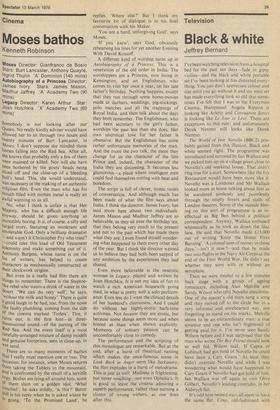Cinema
Moses bathos
Kenneth Robinson
Moses Director: Gianfranco de Bosio Stars: Burt Lancaster, Anthony Quayle, Ingrid Thulin 'A Dominion (140 mins) Autobiography of a Princess Director: James Ivory Stars: James Mason, Madhur Jaffrey 'A' Academy Two (90 mins) Legacy Director: Karen Arthur Star: Joan Hotchkis 'X' Academy Two (60 mins) Somebody is not looking after our Queen. No really kindly adviser would have allowed her to sit through two hours and twenty minutes of Burt Lancaster, in IVIoses. I don't suppose she minded those horses falling into the Red Sea. After all, She knows that probably only a few of them were maimed or killed. Nor will she have been bothered by the goats' heads being Sliced off and the close-up of a bleeding bull's head. This, she would understand, was necessary in the making of an authentic religious film. Even the man who has his Mouth filled with molten metal is really an awful warning to us all.
No, what I think is unfair is that Her Majesty, who has a difficult enough life "flyway, should be given anything so incredibly boring. It is, of course, a silly and turgid story, featuring an intolerant and intolerable God. Only a brilliant dramatist —and wasn't it Christopher Fry who tried? —could take this load of Old Testament Solemnity and make something out of it. Anthony Burgess, whose name is on the list of writers, has helped to create characters as mechanically constructed as their clockwork origins.
But even in a really bad film there are things to remember. There is the Steptoelike rebel who wants a drink of water in the desert. 'We can do very well', he says, Without the milk and honey'. There is quite a good laugh to be had, too, from the noise like faulty plumbing, coming from the side or the cinema marked 'Toilets'. This, it turns out, is the first hint—in threedimensional sound—of the parting of the Red Sea. And the event itself is a most carefully-arranged mixture of damp models and genuine footprints, seen in close-up, in Wet sand.
There are so many moments of bathos that I really must mention one or two. The occasion, for instance, when Moses returns from taking the Tablets to the mountain, and is confronted by the result of a terrible Orgy. Bodies are lying all around him, some of them slain on a golden idol. 'What rMschier, he asks mildly, 'is this?' Better Still is his reply when he is asked where he Is going. 'To the Promised Land', he
replies. 'Where else?' But I think my favourite bit of dialogue is in his final conversation with his Maker.
'You are a hard, unforgiving God', says Moses.
'If you knew', says God, obviously rehearsing his lines for yet another Evening With David Kossoff.
A different kind of worship turns up in Autobiography of a Princess. This is a veneration of the old order in India. The worshippers are a Princess, now living in Kensington, and an Englishman who comes to visit her once a year, on her late father's birthday. Nothing happens, except that they run through some home-movies made at durbars, weddings, pig-stickings, polo matches and all the trappings of Royal India, and then talk about the days they both remember. The Englishman, who had been secretary to the girl's father, worships the past less than she does. Her own uncritical love for her father is obsessive. But the Englishman has some rather unfortunate memories of the man. And the more the /wo talk, the more they change for us the character of the late Prince and, indeed, the character of the India they are discussing. It becomes less glamorous—a place where intelligent men could find themselves rotting with heat and boredom.
The script is full of clever, ironic twists of conversation. And although much has been made of what the film says about India, I think the director, James Ivory, has said more here about two individuals. James Mason and Madhur Jaffrey are so believable, as they sit over the birthday tea, that they belong very much to the present and not to the past which has made them what they are. I even found myself wondering what happened to them every other day of the year. But I think the director wanted us to believe they had both been sapped of any ambition by the experiences they had shared.
Even more believable is the neurotic woman in Legacy, played and written by Joan Hotchkis. It is not my idea of fun to watch a rich American housewife going mad, in what is pretty well a solo performance. Even less do I want the clinical details of her husband's clumsiness, And I could do without her highly-erotic bath-time activities. Not because they are erotic, but because some things seem more sad when hinted at than when shown explicitly. Moments of solitary passion can be uncomfortably close to comedy.
The performance and the scripting of this monologue are remarkable. But at the end, after a burst of theatrical ranting which makes the once-famous scene in Look Back in Anger seem like Jackanory, the film explodes in a burst of melodrama. This is just as well. Madness is frightening, but never touching—not even Ophelia's. It is good to leave the cinema admiring a superb performance, rather than nursing a cluster of wrung withers, as one does after this.


































 Previous page
Previous page